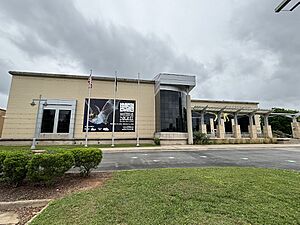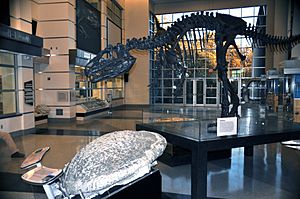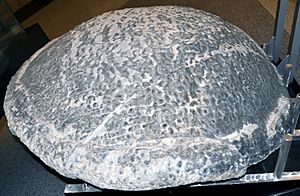Virginia Museum of Natural History facts for kids
 |
|
| Established | 1984 |
|---|---|
| Location | 21 Starling Avenue, Martinsville, Virginia, 24112 |
The Virginia Museum of Natural History is a cool place in Martinsville, Virginia. It's the state's official natural history museum. It first opened in 1984. The museum works with the Smithsonian Institution. It has over 22 million amazing items! One special item is a huge stromatolite fossil. It's over 5 feet wide and weighs more than 2 tons. This is one of the biggest complete stromatolite fossils ever found.
Contents
- Museum History: How It Started
- Explore the Exhibits: What You Can See
- Special & Traveling Exhibits
- Permanent Exhibits: Always There to Discover
- The Harvest Foundation Hall of Ancient Life
- Uncovering Virginia: Digging Up the Past
- How Nature Works: Earth's Amazing Forces
- The Hahn Hall of Biodiversity: Animals from Africa
- Fossil Overlook: Prehistoric Life
- Hooker Furniture Discovery Reef: Fun for Little Kids
- Three Cultures, Three Stories: Online Exhibit
- Research & Collections: What Scientists Do
- Education & Programs: Learning is Fun!
- See also
Museum History: How It Started
The Virginia Museum of Natural History began in 1984. It was first called The Boaz Foundation. Dr. Noel T. Boaz and Dr. Dorothy Dechant Boaz started it. It was a private museum at first.
On June 2, 1985, the museum opened to the public. It was given its current name then. In 1988, leaders like A. L. Philpott helped the museum. It became an official agency of the Commonwealth of Virginia. The museum was recognized by the American Alliance of Museums in 1994. This means it met high standards.
A new museum building opened on March 31, 2007. This is where the museum is today. In 2010, the museum was checked again. It earned re-accreditation from the American Alliance of Museums. This is a big honor! Only a few museums in America get this.
Explore the Exhibits: What You Can See
The Virginia Museum of Natural History has many exciting exhibits. Some are always there, and some change. The museum also shares its exhibits with other places. You can find VMNH items in museums and state parks across Virginia.
Special & Traveling Exhibits
The museum often has new exhibits. These special exhibits focus on different topics. For example, in 2017, there was an exhibit called Exploring Virginia. It showed how archaeologists study the past. Another special exhibit that opened in July 2017 was all about Dinosaurs!
Permanent Exhibits: Always There to Discover
The museum has several amazing exhibits that are always open.
The Harvest Foundation Hall of Ancient Life
This hall greets you when you enter the museum. You'll see a huge Allosaurus dinosaur skeleton. A 14-million-year-old whale skeleton hangs from the ceiling. You can even peek into the museum's labs! Scientists and volunteers work there. This hall also features a Pteranodon and the giant Stromatolite.
Uncovering Virginia: Digging Up the Past
This exhibit shows you six research sites in Virginia. VMNH scientists have worked at these places. You can see how these sites look today. You can also try being a scientist! You get to examine fossils and use tools. Videos bring ancient plants and animals to life.
How Nature Works: Earth's Amazing Forces
This gallery teaches you about Earth's power. It shows how energy from inside the Earth and from the sun shaped our world. You can interact with exhibits. This helps you understand the big forces that created our planet.
The Hahn Hall of Biodiversity: Animals from Africa
This hall opened in August 2010. It features an amazing collection of African mammals. Dr. Thomas Marshall Hahn Jr. donated these animals. He was the President of Virginia Tech. His collection helps teach visitors of all ages.
Fossil Overlook: Prehistoric Life
The Fossil Overlook is a newer exhibit. It's on the museum's upper level. You can see many different fossils here. There are also detailed models and casts. Interactive programs help you learn about prehistoric life.
Hooker Furniture Discovery Reef: Fun for Little Kids
This exhibit opened in 2010. It's a fun, interactive play area. It's designed for children aged 8 and under.
Three Cultures, Three Stories: Online Exhibit
This is an online exhibit on the museum's website. It teaches about three Native American tribes. You can learn about the Pueblo, Powhattan, and Lakota cultures.
Research & Collections: What Scientists Do
The Virginia Museum of Natural History is known for its research. Scientists here study many things. They look at Invertebrate Paleontology (old bugs and shells). They also study Vertebrate Paleontology (old bones). Other research areas include recent invertebrates, Archaeology, Mammalogy (mammals), Marine Science (ocean life), and Earth Science. These researchers use over 10 million items. These are called specimens in the museum's collections.
Education & Programs: Learning is Fun!
The VMNH has many programs for students and teachers. All year long, the museum offers activities, games, and crafts for kids. You can even have sleepovers at the museum! It's also a great place for birthday parties. Children can join the museum's Boy and Girl Scouts program.
During the summer, the museum has Adventure Camps. These camps are fun and educational for young students. The VMNH also helps the community. It works with the MHC After 3 Program. This program gives kids a safe place after school. It also helps them with math and other skills.
Through its outreach program, museum educators visit schools. They bring natural history to students with hands-on activities. Teachers also get training from the museum. Programs like VSSI, VSISE, GLOBE, and Trout in the Classroom help teachers.
See also
 In Spanish: Museo de Historia Natural de Virginia para niños
In Spanish: Museo de Historia Natural de Virginia para niños
 | Dorothy Vaughan |
 | Charles Henry Turner |
 | Hildrus Poindexter |
 | Henry Cecil McBay |



